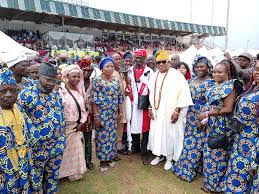Nigeria’s rich tapestry of cultural festivals continues to thrive in 2025, showcasing the nation’s diverse traditions, arts, and communal spirit. From the historic Ibadan Cultural Festival to other significant celebrations across the country, these events not only preserve heritage but also bolster tourism and community pride.
Festivals Held So Far in 2025
1. Ibadan Cultural Festival (May 17, 2025)

The Ibadan Cultural Festival, organized by the Central Council of Ibadan Indigenes (CCII), took place on May 17, 2025, at the Obafemi Awolowo Stadium in Ibadan. This week-long event celebrated the rich heritage and unity of the Ibadan people through traditional dances, music, and cultural exhibitions. Governor Seyi Makinde of Oyo State graced the occasion, emphasizing the importance of preserving indigenous cultures and promoting tourism in the region.
2. Argungu International Fishing Festival (February 2025)
Held in Kebbi State, the Argungu International Fishing Festival is one of Nigeria’s most iconic cultural events. In February 2025, the festival attracted thousands of visitors who witnessed the traditional fishing competition, where fishermen armed with large fishnet scoops attempt to catch the biggest fish. The event also featured cultural dances, music, and a display of local crafts, highlighting the rich cultural heritage of the Kebbi people.
3) Lagos Fanti Festival (April 2025)
The Lagos Fanti Festival, held in April 2025, is a vibrant celebration that showcases the rich cultural heritage shared between Nigeria and the Fanti people of Ghana, as well as broader West African traditions. Far from being exclusive to Ghana, the festival is embraced by Lagosians and Nigerians, reflecting regional unity through colorful parades, traditional music, dance, storytelling, and cuisine. This event is part of Lagos State’s broader efforts to promote year-round cultural tourism, highlighting the interconnectedness of West African cultures and celebrating diversity.
Upcoming Festivals in 2025
1. Osun-Osogbo Festival (August 2025)
Scheduled for August 2025, the Osun-Osogbo Festival in Osun State is a two-week-long event honoring the Osun River goddess. Held in the sacred Osun-Osogbo grove, a UNESCO World Heritage Site, the festival features rituals, traditional dances, and music, attracting pilgrims and tourists from around the world.
2. Ojude Oba Festival (July 2025)
The Ojude Oba Festival, held in Ijebu-Ode, Ogun State, is a vibrant celebration featuring parades, cultural displays, and horse riding. Scheduled for July 2025, the festival brings together people of all ages and backgrounds to honor the Awujale, the traditional ruler of Ijebu land.
3. Eyo Festival (Lagos Island, August 2025)
The Eyo Festival, known as the Adamu Orisa Play, is unique to Lagos and features white-clad masquerades wielding staffs. Traditionally performed on Lagos Island, the festival is a significant cultural event attracting numerous spectators.
4. Igogo Festival (Owo, Ondo State, September 2025)
Held annually in Owo during September, the Igogo Festival honors Queen Orosen. The 17-day event includes traditional dances, rituals, and unique customs, such as the king and chiefs dressing in female attire to commemorate the queen’s legacy.
5. Ṣàngó Festival (Oyo State, August 2025)
This ten-day festival, observed between August 8th and 17th, celebrates Ṣàngó, the deity of thunder and fire. Held at the palace of the Alaafin of Oyo, the event includes rituals, dances, and cultural displays.
6. Orò Festival (Various Yoruba Communities, August 2025)
The Orò Festival is celebrated in many Yoruba towns and is exclusive to male descendants. During the festival, women and non-natives are expected to stay indoors, as it involves secretive rituals and processions.
7. Ofala Festival (Onitsha, Anambra State, October 2025)
Celebrated by the Onitsha people, the Ofala Festival marks the annual coronation of the Obi (king). The event features traditional dances, masquerades, and royal processions, offering insights into the community’s rich traditions.
8. Igue Festival (Benin City, Edo State, December 2025)
Taking place in late December in Benin City, the Igue Festival is a two-week event serving as a New Year Thanksgiving. It includes purification rituals, shrine offerings, and ceremonial dances, reflecting Benin’s rich history and traditions.
Preserving Nigeria’s Cultural Heritage
The continuity of these festivals is crucial for safeguarding Nigeria’s intangible cultural heritage. Many of these events have ancient origins, some dating back centuries, and encapsulate the beliefs, values, and histories of different ethnic groups. Government agencies, cultural organizations, and traditional institutions collaborate to maintain the authenticity and vibrancy of these festivals while adapting them to modern contexts, such as including contemporary music or improving facilities for tourists.
Additionally, many festivals have embraced technology to reach wider audiences. Live streaming and social media have allowed Nigerians in the diaspora and global culture enthusiasts to participate virtually, enhancing cultural exchange and awareness.
Challenges and Opportunities
Despite their importance, Nigerian festivals face challenges such as funding constraints, infrastructural deficits, and sometimes political interference. There are also concerns about commercialization diluting traditional values. However, these challenges present opportunities for innovative solutions. Partnerships with private sectors, cultural NGOs, and international bodies have increased, bringing investment and expertise to festival management.
Furthermore, the rise of cultural tourism offers promising prospects. As Nigeria continues to develop its tourism infrastructure, festivals will likely play an even larger role in the country’s cultural diplomacy and economic diversification.
Nigeria’s festivals are a treasure trove of history, art, spirituality, and community. They provide continuity between the past and present, offering each generation a chance to celebrate and redefine their cultural identity. Whether experienced in person or through digital platforms, these festivals continue to enchant, educate, and empower. As Nigeria advances in 2025, its festivals remain a shining testament to the country’s resilience, diversity, and creativity.












Leave a comment